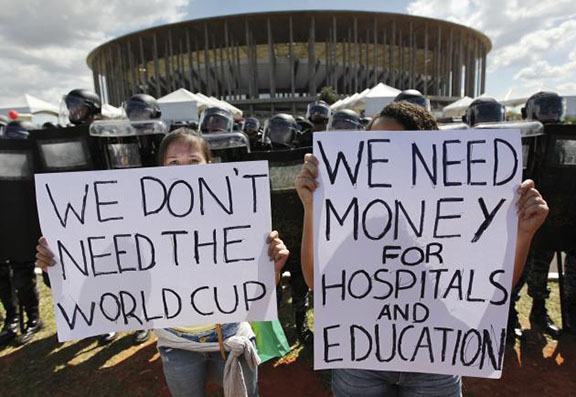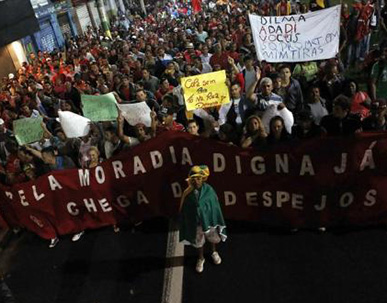Fernando Silva interviewed by João Machado
June 16, 2014
JM: What is the situation today concerning the mobilizations in Brazil against the cost of the World Cup?
FS: In actual fact the mobilizations taking place at present in Brazil are much broader than the protests against the World Cup. Since the days of June 2013, when hundreds of thousands took to the streets in demonstrations in over 500 cities, a new situation has opened up, with the relaunching of major social struggles. For example: there are many more strikes for wage increases, many of them against the will of the bureaucratic union leaders; there are occupations of urban land and road blockades by movements fighting for housing; there are student strikes, struggles in the periphery against police repression, struggles of indigenous peoples affected by the expansion of agro- industry. And, of course, demonstrations in different cities against the money being spent and the crimes around the football World Cup.
At the present moment, on the eve of the World Cup, the most important struggles are the strikes in transport and education and the popular struggle for housing. These are very massive struggles, radicalized battles, paralyzing big cities, where the problem of urban mobility is very serious, and where a strike on the underground or the buses can be enough to cause problems for production in other sectors of the economy.

The World Cup has been organized almost entirely with public money (more than 26 billion reals, between the construction of the stadiums and the work on their surroundings, on airports, etc.). The vast majority of this work has not been completed, which shows that money has been diverted towards the sinks of corruption. Billions of reals have been spent on the stadiums and have not led to any progress concerning infrastructure and urban mobility.
And if we add the fact that we are in a country where the public health system is existing on the brink of collapse, where fundamental problems of housing for all and basic sanitation have not been resolved, the expenses for the World Cup have been considered as an unnecessary luxury, a waste, a lack of respect for the situation of the majority of the population. It should also be taken into consideration that tickets for the games are expensive and that FIFA has imposed, with “the general law of the Cup,” a real state of emergency. The result is that there is a critical attitude towards achieving the organization of the Cup, which is surprising, considering the relationship that Brazil has with football. In the most recent opinion poll, less than half of the population supports the organization of the World Cup in Brazil. That is very impressive in a country where football is part of the national culture.
JM: How is the present PT government responding to this movement?
FS: Basically in three ways: a) it has tried to intensify its policy of small concessions to the poorest sectors of the working class (a small readjustment of the “Family Grant”, even lower than the rate of inflation, an increase in the minimum wage, even below what would be necessary), the announcement of partial increases in investment (on education and on urban mobility); b) it has organized an enormous repressive apparatus to contain the demonstrations during the World Cup and adopted a tough policy of criminalizing protest from the legal point of view. To give you an idea, the federal government has spent 500 million reals in security for the World Cup (weapons, high-tech control and espionage). The army will be in the streets of the cities of São Paulo and Rio de Janeiro during the Cup; c) it is conducting broad nationalist propaganda and pro-Cup euphoria to try and convince people that the time has come to “make an effort” for the country, to make it a great World Cup, etc. Some media personalities have said that demonstrations should be left until after the World Cup.
The situation in the country is very contradictory, because although the population will follow the matches, given the huge interest in football in Brazil, especially in a World Cup, there is no euphoria here; there is a very critical state of mind, a great readiness to protest and demand. While I am giving this interview, less than seven days before the opening of the World Cup, a strike by underground workers has largely paralyzed public transport and traffic in São Paulo and about 20,000 homeless people (sem teto ) have organized a protest at the gates of the stadium where there will be the opening ceremony of the Cup.
JM: How can the radical left here in France can relay mobilization of people in Brazil?
FS: By spreading information about the social struggles in Brazil, and by denouncing the repression that is preparing to put into effect a real state of emergency in the cities during the World Cup. By taking advantage of this month’s World Cup to explain that the social-liberal governments of the PT are not allies of the struggles of the working class, because what they are doing in Brazil is to govern in alliance with financial capital, with the major public works contractors and with industrial agribusiness. It is very important to help us by explaining that there is not a real left in power in Brazil, that the PT government is similar to what the governments of socialist parties are like in Europe, and even worse because the government here is even more dependent on and subordinate to financial capital, and also very involved in agribusiness, among other tragedies, which is contributing to deforestation, the contamination of water and an increase the greenhouse gas effect.
JM: Does the social radicalism which has been manifested for several months in Brazil, particularly against the high cost of living, have a political expression?
FS: That is a very sharp contradiction in the process. The June days in 2013 demonstrated an enormous erosion of popular support and a crisis of traditional political representation, including the trade unions, which are among the weakest institutions. But it has not developed, for the moment, a process of building a national leadership, or new mass organizations and clear references to a new political project.

Thousands of homeless workers, members of MTST, march on one of the World Cup stadiums in São Paulo. Photo by Nacho Doce, Reuters.
There are sectoral and partial expressions such as the Movement for the “Pass Book” (free transport) (MPL), which became extremely important in June 2013 because it was at the head of the struggle for transport and for the reduction of bus, train and underground fares in São Paulo. Today the MTST (Movement of Homeless Workers) has gained a lot of respect and has established itself as a reference point on a national level, although it is stronger in São Paulo. But these movements are sectoral and they do not pose, or are not intended to be the axis of, the question of the formation of new structures of general leadership. In the political sphere, the PSOL is respected by these movements and among the radical political parties it is the one that can best engage with the demands of the street. But it is still very fragile, and it is torn by an internal conflict between two increasingly incompatible visions of the party. One sector (which has at present the majority of the leadership) is more and more openly reformist, and it has the bureaucratic practices of the old left; facing it, there is a broad left bloc which includes various forces of the Brazilian revolutionary left, which constitute half the party. These forces are usually much more open and tuned in to the demands of the streets. The proof is that it is the youth currents which are led by left sectors of the PSOL that can fit better into the new processes and even conduct a dialogue with the distrust and the “autonomist” profile of the demonstrations.
The fundamental question is that there is a chasm, which is even a generational gap between the old and the new left. The youth, the younger sections of the population, were the axis of the protests in June 2013, and it is especially they who have been the driving force of the subsequent processes of mobilization. This generation has entered the political arena by the school of the streets and by seeing the PT in power. That is to say that in the eyes of the youth, the left is in power. Therefore, there is a very strong process of negation, there is a lot of mistrust of traditional instruments such as the party, unions, and concerning what exactly is socialism. We are still at the beginning of the remobilization of the movement in Brazil, with a break between the old and the new, but there are many uncertainties, because only the development of the process and good participation (not dogmatic and not “apparatus-centred”) of the radical anti-capitalist left can begin to give shape to new instruments and a new political leadership that is able to relaunch a political project of a systemic break which has mass support.
JM: What are the prospects for the Brazilian left, especially with the elections in October?
FS: It is still difficult to predict. In general, the situation is much better for an anti-capitalist left to be able to achieve greater visibility in the elections. The space to the left of the PT is an open space, but not a broad avenue. For the majority of people, the PT is still perceived as the lesser evil, given the fact that the alternatives to the right or the “centre” are ineffective or disastrous in the eyes of most people. On the other hand, there is mistrust or discredit concerning parties and elections, and this is very strong among young people. Surveys and analyses have shown that the forthcoming elections will be marked by a significant increase in abstention (even though voting is compulsory in Brazil) and in blank votes and spoiled ballot papers.
Furthermore, there will be no single candidate of the parties of the radical left and there is a danger of the PSOL having a profile of a very institutional campaign (if the line of the presidential candidate of the current majority does not change, which constitutes what I called above the representation of the old in the new politics).
Even with these problems, it is the PSOL which has been growing, including on the electoral level, since 2010. It is the party which is best placed to take advantage of this new situation and of the space that is open for a left critique in society, which is greater than four years ago. Maybe not so much at the national level (the presidential election), and more in state elections and for the election of members of parliament.
Fernando Silva is at present the general secretary of the PSOL and a member of the National Coordination of Insurgência (a current within the PSOL). This interview with João Machado was first published in the newspaper of the NPA in France, l’Anticapitaliste, and was previously published in English on International Viewpoint.
